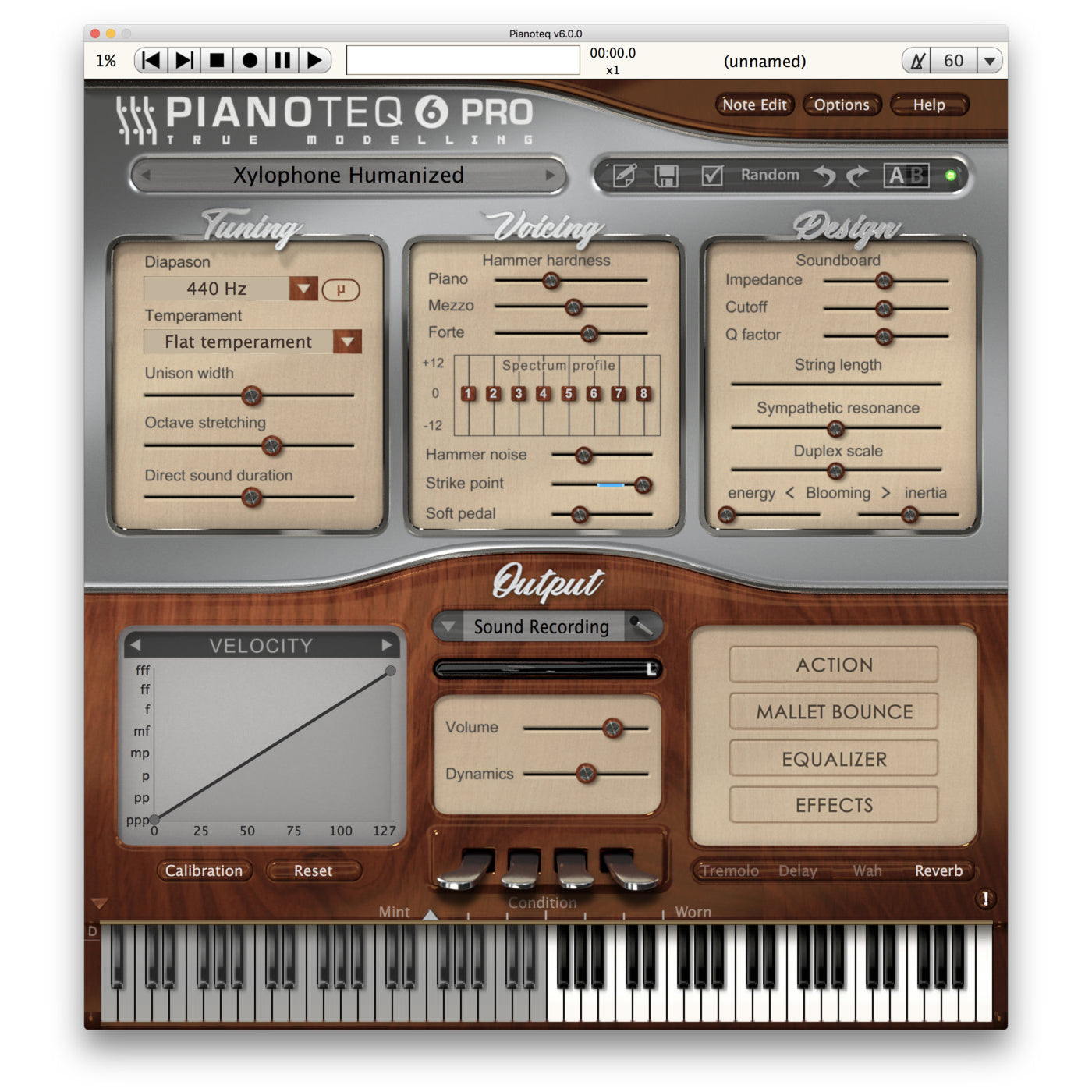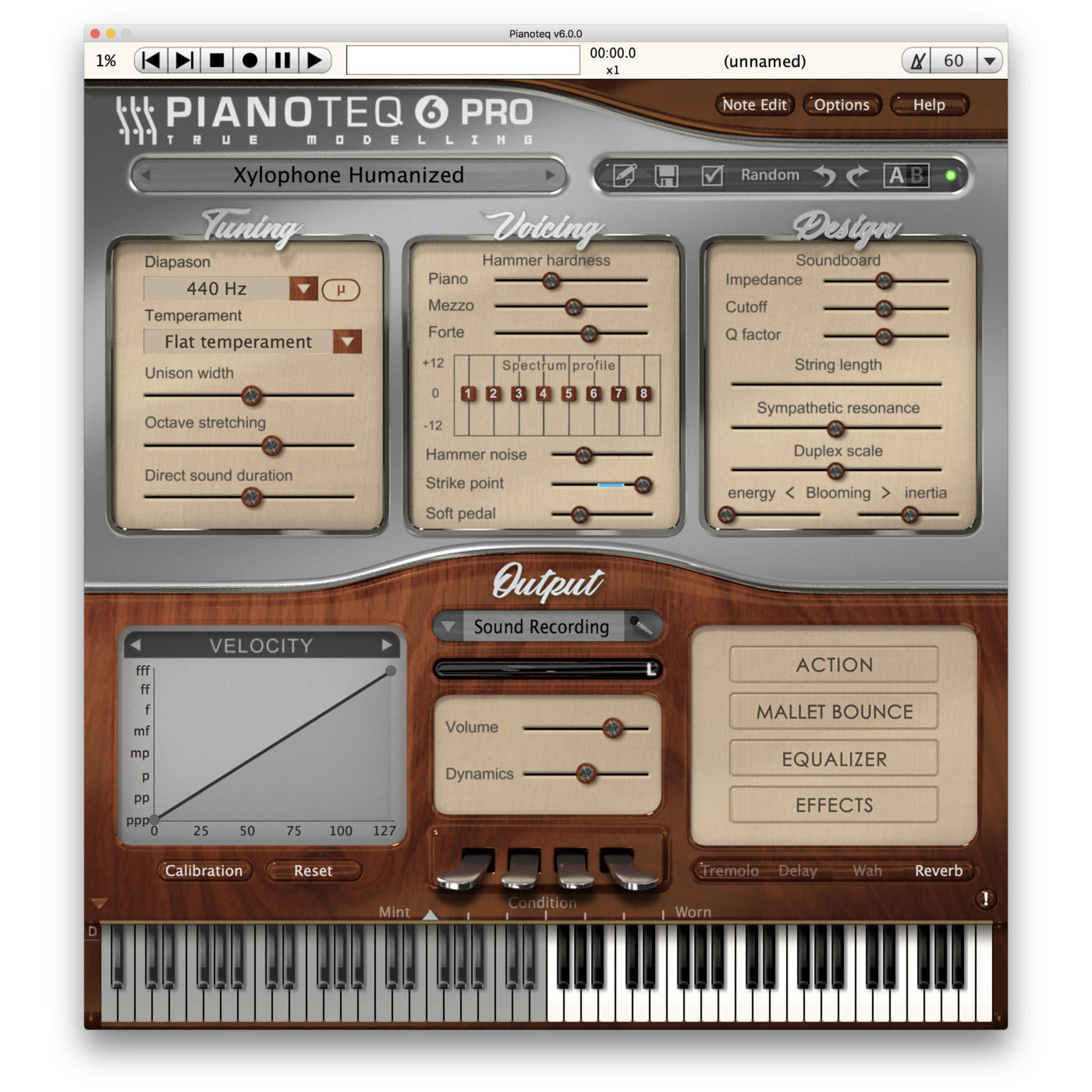Description
Pianoteq Xylo Xylophone and Bass Marimba Virtual Instrument || Your Digital Software Registration Code and Instructions Will Be Sent to You, Along With an URL Connecting You Directly to The Manufacturer, Who Will Provide You With Your Software Digitally. Please Be Aware That Software Is Non-Cancelable and Non-Returnable. If you have any questions about this product please do not hesitate to contact us. Guildwater Gear is an Authorized Pianoteq Dealer through the Xchange Market. There, You Can Find Us Among Their List of Authorized Resellers.
Xylophone and Bass Marimba are similar to the vibraphone but are using wooden bars instead of aluminium. Each bar, that vibrates when hit with mallets, is paired with a metallic resonator which is tuned to amplify the sound.
Xylophone and Bass Marimba are similar to the vibraphone but are using wooden bars instead of aluminium. Each bar, that vibrates when hit with mallets, is paired with a metallic resonator which is tuned to amplify the sound.
The origin of the xylophone dates back several thousand years in Africa and South East Asia. The marimba appeared at the same time and is today the symbol of Guatemalan music. Due to its huge size, the bass marimba sounds more than two octaves below the xylophone. Very popular both, they are used in various musical styles from classical to Latin and rock.
The Pianoteq virtual copies of these two instruments are respectively modelled after a modern 3½-octave French brand xylophone and a modern 5-octave French brand bass marimba. Thanks to the sophisticated Pianoteq physical model, they come in several variants and benefit from the recently developed humanization feature which allows varying the strike point, adding to the musician's interpretation a vivid and stunning realism.
System Requirements
Requires Pianoteq 3.6.4 or Higher
- Mac OS X 10.7 or later, Windows 7 or later, Linux (x86 and ARM)
- Audio Units / VST / AAX / NKS compatible
Pianoteq 6 facilitates your workflow by adding compatibility with the VST3 format and the ARM architecture (Linux version only, for example on Raspberry Pi 3 boards). VST3 is the latest plug-in platform developed by Steinberg, and is supported by many audio hosts. Compatibility with the ARM architecture means that Pianoteq 6 can be used with RISC based CPU's used in smaller Linux based consumer electronic devices. Furthermore, since Pianoteq 6.1, the NKS (Native Kontrol Standard) extended plug-in format from Native Instruments is supported.
Pianoteq Features
- Pianoteq is a physically modelled virtual instrument
- Optional instruments for purchase: upright, grand pianos, rock piano, electric pianos, harp, vibraphones, clavinet, celesta+glockenspiel, xylophone+marimba, steelpans
- Free instruments: KIViR historical instruments collection, bells and carillons.
- Unique adjustable physical parameters, such as unison width, octave stretching, hammer hardness, soundboard, string length, sympathetic resonance, duplex scale resonance.
- Progressive variation of the timbre (uses all the 127 MIDI velocities)
- Control of the dynamics in timbre and volume
- Polyphonic Aftertouch (particularly interesting for the clavichord)
- Realistic sympathetic resonances, including duplex scale
- Microtuning, supports Scala format *
- Adjustable mechanical noises (sampled or modelled)
- Built-in graphic equalizer
- Built-in graphic curve for key velocity, note-off and pedal
- Keyboard calibration assistant
- Ten types of pedals (that can be assigned to the four UI pedals): Sustain, Soft, Harmonic, Sostenuto, Super Sostenuto, Rattle, Buff Stop, Celeste, Pinch Harmonic, Glissando
- Progressive sustain pedal, allowing partial-pedal effects
- Convolution reverberations
- Effects: Tremolo, Wah, Chorus, Flanger, Phaser, Fuzz, Delay, Amp, Compressor, Mini-eq.
- Mallet bounce (note repetition)
- Instrument condition (mint to worn)
- Variable lid position *
- Five adjustable microphones *
- Multi channel - up to 5 channels *
- No quantization noise (32-bit internal computation)
- Renders high resolution MIDI formats CC#88 and Disklavier XP.
- Installs and loads in seconds
- Extremely small file size (less than 50 MB)
- Excellent for use on modern laptops
- Extended key range (105 keys = 8+2/3 octaves) for the grand pianos Steinway D and K2
(* in Standard and PRO versions)

